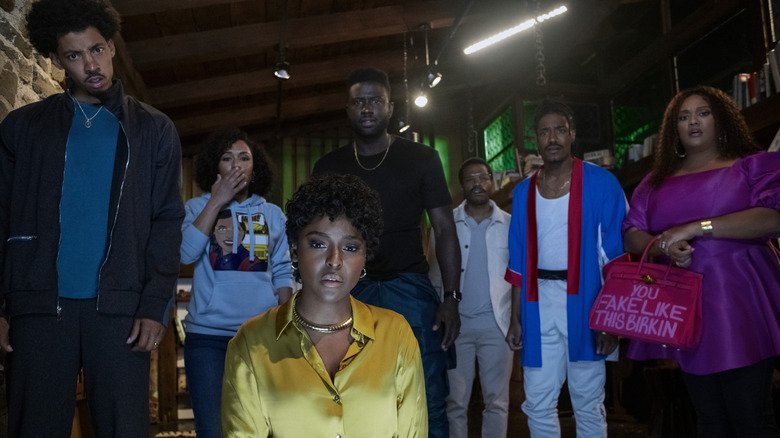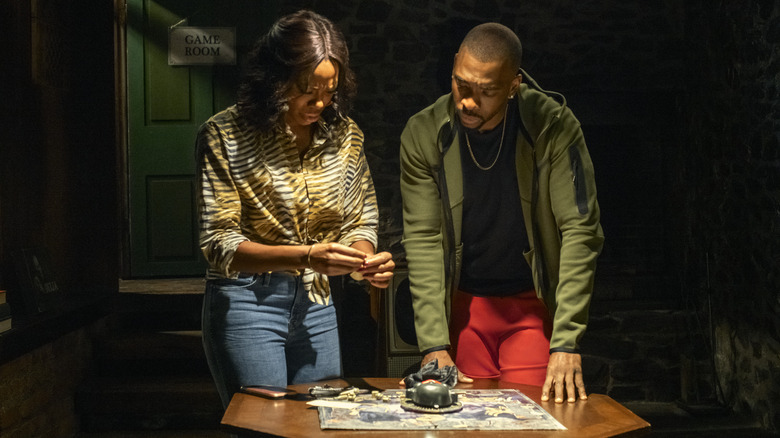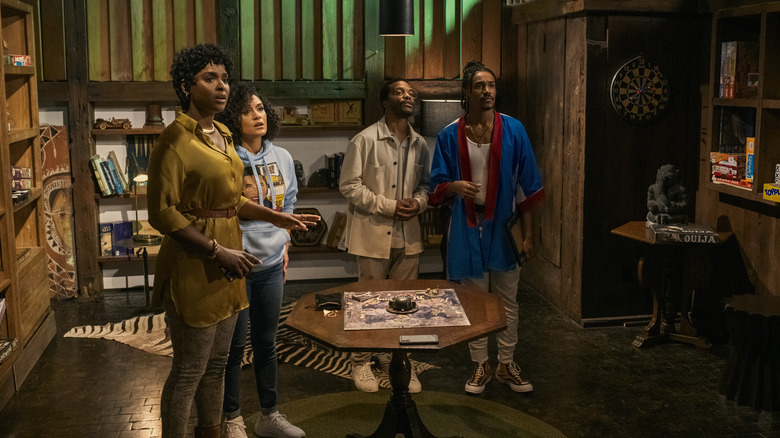The Blackening Review: Play No Games
- An excellent ensemble cast does great work.
- It pulls off a clever genre subversion.
- The film could have benefitted from a more adventurous director.
- Much of the comedy will make you smile more than laugh out loud.
Though aggressively marketed as the second coming of mid-aughts parody fare like the "Scary Movie" films, "The Blackening" is far more interesting that those zany pictures, but also less laugh out loud funny. It's a sharp comedy, driven largely by acute cultural observations, but provides much less insight into the genre it's designed to send up.
Based on a viral digital short from Chicago comedy troupe 3peat, "The Blackening" expands the general premise of that one-note bit into a solid feature-length narrative. "Girls Trip" scribe Tracy Oliver is co-credited on the script with original writer Dewayne Perkins, who also stars as "Dewayne," a heightened version of his comedic persona. A group of friends from college rent an AirBnB in the middle of nowhere for a reunion getaway, only to find themselves trapped in a deadly game. Hunted by unseen forces and forced to prove their "Blackness" through a nefarious board game, the group has their personal limits tested, alongside the strength of their interpersonal bonds.
It's a strong set-up for the kind of sociocultural interrogation Perkins' writing seems to do so well, but neither the writers nor director Tim Story do quite enough to explore horror as a genre. It feels more like it was a convenient backdrop than the primary point of inspiration. One can even imagine a similar premise with all the same characters functioning in an altogether different type of movie.
That said, this picture as a whole proves too charming to be quelled by such nitpicks.
Fun and games
Though not principally concerned with horror the way "Scary Movie" or even the "Scream" films were, "The Blackening" still cribs liberally from the latter. The film opens with a prologue that openly references "Scream 2," and how its two introductory Black leads died first because they were too famous to be in the rest of the film. It's a gag that falls a little flat by virtue of "Insecure" star Yvonne Orji and "SNL" vet Jay Pharoah cumulatively lacking the requisite star-power Jada Pinkett-Smith and Omar Epps possessed in 1997, even adjusted to inflation.
From there the film's shaky first act introduces the rest of our ensemble, each representing their own distinctive individual within the Black cultural identity. Though this pays dividends later on and is designed as a rebuke of the tokenizing of lone Black supporting players in horror films, the actual establishment of the characters pales in comparison to the work done once they've been introduced. For a solid 20 minutes there, the film's biggest scare comes from characters speaking in punchlines pulled directly from engagement-seeking tweets on the Black side of Twitter, the sort of flat, cultural signifiers often seen in Black-fronted comedies written by clueless white writers.
But once we get past the film's central "love" triangle — a three-way dance between Lisa (Antoinette Robinson), her gay best friend Dewayne (Dewayne Perkins), and the ex she often ditches said best friend for, Nnamdi (Sinqua Walls) — the remaining cast members all bring plenty of intrigue to the table. There's X Mayo's Shanika, a brash, fun-loving woman who thrives once the danger begins and violence becomes a necessary evil. Grace Byers from "Empire" gets to stretch her comedic chops as biracial Allison, the butt of many a "mixed race" joke in the film, but whose intensity and verve make her a pleasant standout.
The only real outlier is Jermaine Fowler's Clifton, a mega-nerd drawn so broadly as to be the least believable figure in the entire film. There's some spoiler-y rationale to why he's played that way, but it doesn't help matters, as his particular brand of cartoonishness doesn't quite jibe with the delicate tone of the film's best moments.
Call a spade a spade
Back in 2016, Chicago's Second City produced a touring live show called "Black Side of the Moon," a mixture of stand-up, sketch comedy, and theatricality featuring a small troupe of Black comics and actors exploring one key idea: that Black people are not a monolith. Throughout the show a lot of humor was wrung from this concept, and how various African Americans have to measure themselves against a grand median of Blackness. Perkins was one of the show's key writers and performers, and when "The Blackening" finally gets going, the thrust of the drama calls to mind the work done in that live show.
Part of why Tim Story maybe doesn't have the same room to play with on-screen horror tropes is that Dewayne Perkins and Tracy Oliver write much of the second act as if it were a farce for the stage and not a directly cinematic effort. The ensemble work great together, the dialogue is pitch perfect, and there's plenty of humorous seeds planted that pay off in the final act. But all over, it feels more like the movie version of "Clue," with its breathless pace and high speed banter, than something that exists as horror.
There's a bit in the film that plays out as a shaggier version of the sketch that inspired it, but for the money, the extended sequence where our main characters have to play "The Blackening" board game to survive is arguably the film's biggest highlight. There are so many niche gags and nostalgic allusions to the history of Black culture in television, film, music, and sports that each work well enough to paper over any of the film's other foibles.
The initial ideas behind the film's revealed villains is a little too lazy and "Get Out" for 2023, but the deeper motivations unearthed in the final twist paint an interesting picture over everything that's presided before it. It feels like a surprisingly touching rumination on the nature of fitting in with one's racial peers and how not feeling Black enough can have disastrous effects on one's psyche and disposition.
But this is also a movie that has Diedrich Bader as a camp ranger supernaturally attuned to being a good ally, so it's still exactly silly enough to not have the dramatic conclusions it draws be too much of a downer. All in all, I would love to see more from Perkins after "The Blackening," hopefully paired with a director who can make something more cinematic out of his stage-leaning tendencies.
"The Blackening" premieres in theaters June 16.


